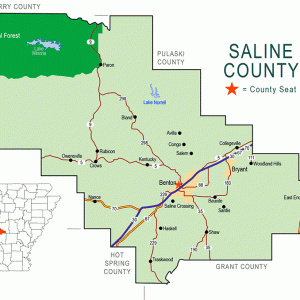calsfoundation@cals.org
Vimy Ridge (Saline County)
Vimy Ridge is an unincorporated community in Otter Township in Saline County, approximately twelve miles southwest of Little Rock (Pulaski County) and three miles southeast of Alexander (Pulaski and Saline counties). Originally known as Germania, the community’s name was changed in 1918 due to anti-German sentiment during World War I.
Early settlers to the area primarily farmed, with most of the land that became the Vimy Ridge community later owned by the St. Louis, Iron Mountain and Southern Railway Company in the 1880s. An influx of German immigrants to the area in the late 1870s and 1880s provided a large addition to the original residents. By 1879, twenty-three German families had migrated to the area, and they began a German colony under the leadership of Nick Spanier, John Rixey, and Henry Pernat. Much of this was a direct result of the coming of the railroad from Little Rock toward the southwest. The Little Rock, Hot Springs and Texas Railway was organized in 1893 and sold to the Little Rock and Hot Springs Western Railroad Company in July 1899. This company was then sold to the St. Louis, Iron Mountain and Southern in September 1909 and eventually merged with the Missouri Pacific Railroad.
An attempt to organize a town was implemented on the Tommy Warthfort farm, which was purchased by the Fordyce Land and Improvement Company. The town plat was created, and roads were built, as were a schoolhouse and general store, but the community was never incorporated. Due to the increase in population, a post office was established named Althorp, and in 1894 the name was changed to Germania in recognition of the many German families residing there.
In 1895, the Otter Creek Missionary Baptist Church was established and named after Otter Creek, which flows through the area. As members moved, the church became inactive sometime after 1898. In 1908, after a brush arbor revival was held, residents established the Germania Missionary Baptist Church, which included many of the former Otter Creek Baptist Church members. A new structure was built within a year. The current structure (the third) was built in 1967. In January 1917, another church was chartered as the Immanuel Baptist Church of Germania. The original structure was moved across the road from its original site in 1935, where the church is located in the twenty-first century.
When the United States entered World War I, anti-German feelings grew among many U.S. citizens. As a result, in June 1918, the post office, churches, and community names were changed to Vimy Ridge, which was the site of a military engagement during the larger British-led Battle of Arras (April 9–12, 1917). The opening phase of the battle was a diversionary attack for the larger French Nivelle Offensive. The battle was the first occasion in which Canadian Expeditionary Forces fought together, and it was made a symbol of Canadian national achievement and sacrifice. No American forces were present at the Canadian victory, and it is not known why Germania residents chose the name, but most likely it was due to the symbolic value of the Allied success.
One notable resident of Vimy Ridge was Robert A. Prather, who was known statewide as the “Sage of Vimy Ridge” in the mid-1900s. Prather was born in Lee County in 1882. After serving during the Spanish-American War in the First Arkansas Infantry, he went to Canada, joining a scout unit, and served in South Africa during the Boer War. Afterward, he returned and settled in Little Rock, working for the railway mail service. During World War I, he helped raise the Fourth Arkansas State Guard and was commissioned a lieutenant, but he did not serve overseas. In 1928, he retired from the mail service and bought a farm in the Vimy Ridge community, where he became active in politics. He ran unsuccessfully for secretary of state in 1938 but continued his political efforts through his regular writing of letters to the editor of the Arkansas Gazette and Arkansas Democrat. One of his key works was a cartoon booklet opposing Sid McMath’s second term as governor, especially ridiculing McMath’s road program. Prather died in 1955 and is buried in Pinecrest Cemetery.
As roads improved, the Vimy Ridge Post Office closed in 1968, with mail service provided from Alexander due to its location near Interstate 30. With the cities of Alexander, Shannon Hills (Saline County), and Mabelvale (Pulaski County) in close proximity, Vimy Ridge retained its semi-rural status as an unincorporated community.
For additional information:
Baker, Russell P. “Vimy Ridge’s One and Only Sage: Robert Alexander Prather.” The Saline 10 (September 1995): 94–95.
Halliburton, Arthur. “Vimy Ridge.” Arkansas Railroader (June 1986): 9–15. Online at http://thundertrain.org/JUNE-1986.pdf (accessed November 12, 2020).
“A Letter from Alexander.” The Saline 7 (September 1992): 133–134.
Anthony Rushing
Benton, Arkansas
 Tornado Outbreak of March 1, 1997
Tornado Outbreak of March 1, 1997 Saline County Map
Saline County Map 




Comments
No comments on this entry yet.